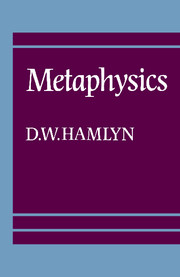10 - Epilogue: Man and nature
Published online by Cambridge University Press: 05 June 2012
Summary
The interrelationship between ‘I’, ‘we’ and the world that I mentioned at the end of the last chapter, and the kind of metaphysics, construed as a general account of reality, that it gives rise to are not quite the same as the interrelationship between man and nature and the account of things which that consideration gives rise to. To move from self to man and from reality or world to nature is to move to a more concrete and less general level. It follows that the philosophical considerations that such a move results in are different from the ones that arise from the conception of metaphysics that I have been presenting (however consistent I have been in that). The philosophical considerations that I have in mind in so speaking arise mainly from the general question whether and to what extent man is part of nature, and whether nature by itself is selfsufficient in the sense of requiring no rationale outside it.
Kant's account of the metaphysics of his time, specified in terms of subject-matter – its concern with God, freedom and immortality – fits this conception of a philosophical concern with man and nature better than it does metaphysics as I have presented it. Does nature need a rationale in something outside it – in a ‘first cause’, a God construed in theistic terms as the ens realissimum and ultimate explanation of everything else: what Anthony Kenny has called, in the title of one of his books, ‘the God of the philosophers’?
- Type
- Chapter
- Information
- Metaphysics , pp. 219 - 220Publisher: Cambridge University PressPrint publication year: 1984

